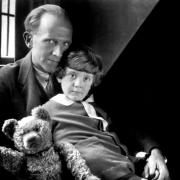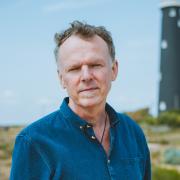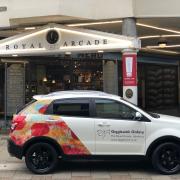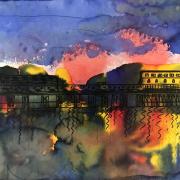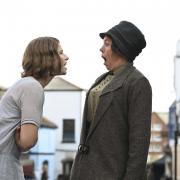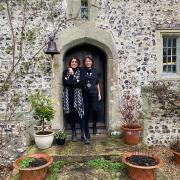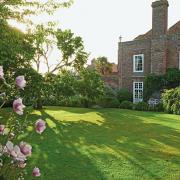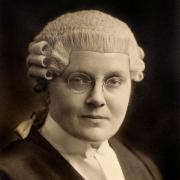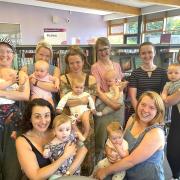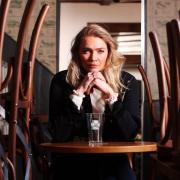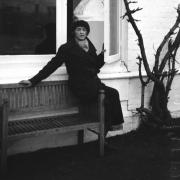A decade ago former newsreader Ed Mitchell was sleeping on a seafront bench. Ten years on the city’s rough sleeping problem hasn’t gone away

In the autumn of 2007 Ed Mitchell found himself sleeping rough on a bench on Hove seafront. He was homeless, unemployed, recently divorced and living hand-to-mouth.
Ed remembers the bench well. It was part of a covered seating area behind a nightclub called the Babylon Lounge. “The benches were hideous and also full of people not easy on the eye, people like me,” he says now. “No-one sat there for pleasure, it was just the last resort for the dispossessed.”
Ed spent four months rough sleeping, enduring a miserable existence. It was an outcome he could not have predicted earlier in life. A high-flier right from university days, he trained as a financial journalist with Reuters and then went into television, presenting business programmes on TV channels in different parts of the world. Handsome, lucid and erudite, he earned six-figure salaries and at the peak of his career was presenting the main ITN Evening News. He had it all but lurking in the background were demons that would eventually cause him to lose the lot. Always keen on a drink, he became addicted to alcohol and it ended up ruling his life. What started out as fun became a trap. “I’d unconsciously built a cramped and gloomy prison for myself,” he says. “I constructed it brick-by-brick despite warnings from others. All it took was many thousands of self-sabotaging, drink-clouded life decisions.”
In 2000 Ed lost his job through being drunk on work premises and it signalled the beginning of a downward spiral. At his worst, Ed was drinking 150 units of alcohol a week, more than ten times today’s recommended limit. And there was something else badly wrong too.
“I was getting into severe financial problems. It was not down to spending excessively just not caring about budgeting,” he says. “I took a devil-may-care attitude to money and fell into debt, which took on a life of its own and became impossible to clear.”
Ed eventually accrued debts of £250,000, fuelled by 25 credit cards, each desperately used to pay off the previous one. The situation had already cost Ed his house and his marriage and in November 2007 he was declared bankrupt. It was rock bottom. By day he was pounding the streets and at night he was on the bench at the Babylon Lounge.
“They were exhausting times,” Ed recalls. “I was leading an isolated life, walking long distances and I never, ever got a proper night’s sleep. Every twist and turn of life seemed to be blocked and I had a feeling of sheer embarrassment that I’d allowed myself to get into that position.”
Ed got by with the help of food, clothing and support from local charities, particularly Off the Fence and Brighton Housing Trust’s First Base, washed down with vodka and strong cider.
Today Ed’s bench at the Babylon Lounge is no longer there, demolished during a seafront face-lift. And the Babylon Lounge is gone also – the building is now a beach restaurant called The Venue. Most importantly, Ed has moved on too. He now has a roof over his head and is a whole lot happier.

His salvation came through a stroke of fortune. In early December 2007, Ed’s riches to rags story was covered in The Argus, sparking a frenzy of interest in his plight. He was soon in national newspapers and a documentary was set in motion for prime time television. In it he would be seen being sick and crying. One person who got to hear about Ed’s predicament was businessman Dan Butcher, who was setting up an internet service to help addicts and their families. He offered to fund a stay at the Priory Hospital at Roehampton for Ed to help him quit drinking and set him on a new direction.
It worked. Ed went on to write a best-selling book about his experiences. This month is the tenth anniversary of the publication of From Headlines to Hard Times, a detailed record of life in a dark place. It may be ten years old but the book is, if anything, more relevant today than it was then.
Paul Young is chief executive of Off the Fence, which gave life-saving help to Ed while he was on the streets. It is a charity that has tackled social poverty in Brighton and Hove for more than 20 years and its Antifreeze project helps with all stages of homelessness, from those couch-surfing or living in hostels or temporary accommodation to those facing the ultimate indignity – rough sleepers. Its help centre sees up to 60 people a day and an emergency outreach team works outside into the night.
“Homelessness has doubled over the past four years across the country,” Paul says. “Nationwide 250,000 people approach their local authority each year seeking assistance – they are a hair’s breadth away from homelessness. So many people are on the edge.”
A spot count of rough sleepers across the country in autumn 2017 showed an increase for the seventh year running. In the Brighton and Hove council area the figure was 178, exceeded only by Westminster in London. Worthing, Eastbourne and Hastings also had high numbers. But Paul says the problem is worse still. “The council will say 150-200 people are sleeping rough in the city on any one night but you can double that. We have become used to seeing people on the streets almost as if it has become normal.
“And there are another 2,000 here classed as ‘poorly housed’, such as those living in cars or tents under the pier.”
So what drives people onto the streets? In Ed’s case it was a toxic cocktail of debt and alcohol but for others the triggers are different. “The number one problem is mental health,” says Paul. “In Brighton a significant proportion of people on the street are ex-military. They are suffering. A lot of people on the streets should actually be in hospital. We also see family breakdowns and the effect of the loss of a partner. Often the drinking issues come later.”
Off the Fence says that in 2017 22 people lost their lives living on the streets in Brighton and Hove.Life expectancy for a male rough sleeper is 47 while for a female it is 43.
Paul lays the blame for the rough sleeping epidemic here on the high price of local housing but also on the level of funding of public services. “Within national government social services budgets have been cut again and again. Hostels, rehabs and mental health centres are lacking. We are reaping what has been sown.”
Last summer the Government announced a £100m plan to end rough sleeping by 2027 but Off the Fence is not impressed. “That amount of money is not even going to touch the problem,” argues Paul. “We could do with £100m in Brighton alone.”
That is in spite of the big efforts already underway in Brighton to tackle social issues of this sort, involving multiple organisations. Brighton and Hove City Council itself offers an early intervention service to help prevent homelessness and runs a street outreach service in conjunction with St Mungo’s. It provides a rough sleeping hub with Brighton Housing Trust, a winter night shelter and a cold weather emergency shelter. It also supports the local churches’ night shelter.
For Ed rough sleeping luckily remains in the past. He now lives in a rented flat above a shop in Shoreham. Since writing his book he has found work through freelance writing and training broadcast presenters for start-up TV stations in Delhi, Dacca and Lagos. He has also been back in the studio himself, presenting a business programme on Share Radio in London. Today he receives the basic state pension and his standard of living is modest. “Living requires a very tight belt,” he says. “The money that comes in all goes out, but I am able to buy books and I spend a lot of time reading. And Shoreham beach is nearby and lovely.”
Compared with times past, life is good and one major contributor to this is Mandy, once his drinking partner, then part of his salvation and, since 2012, his wife. Mandy used to take Ed hot drinks and sandwiches when he was on the streets and has been a huge influence on his life. “Mandy is the single most important factor in keeping me going. I would say she used to be an enthusiastic drinker but she managed to knock it on the head completely. She’s a tremendous support. If I hadn’t met her, I suspect the old demons would have returned. I know she doesn’t like drinking now and that’s a huge encouragement for me not to do it.”
But although Ed is much better he has not managed to abstain totally. He has had relapses but when we speak he says he has not had a drink for two months.
“The old feelings for alcohol come back now and again. It’s not something I’ve entirely beaten, more something I’ve wrestled under control. Alcohol is associated with every social function and you can’t escape it.”
Ed counts himself as very lucky. Recently he met Mike, someone he had known during his street days.
“He was in a very sorry state. He had a broken arm and was using a zimmer frame. He had aged enormously and drink still had hold of him. We chatted and he told me many people from that time had passed away.
“There’s no other way of putting it: people sleeping on the streets is a glaring failure of civilisation. When I pass rough sleepers now I feel sorry for them and worry about their health. I wonder how they got there and how they are going to get themselves out of it. I do give them money and, because I know just how hard life is for them, I actually don’t mind if they buy alcohol with it.”
That last point might come as a surprise but perhaps the only people who can fully understand life in a dark place and how to survive all its ugliness are those who have been there themselves.
Good to know
• Off the Fence is based at 37 Portland Street in Hove, 01273 733566; www.offthefence.org.uk
• Anyone fearing becoming homeless in Brighton and Hove should contact the council’s Early Intervention Service on 01273 294400.
• Anyone sleeping rough in the city should call StreetLink on 0300 500 0914 or visit www.citizensadvice.org.uk
• Christians Against Poverty (CAP) gives free advice to those affected by debt. Call 0800 328 0006; www.capuk.org
• If you are worried about your own or someone else’s drinking, call Drinkline on 0300 123 1110.




